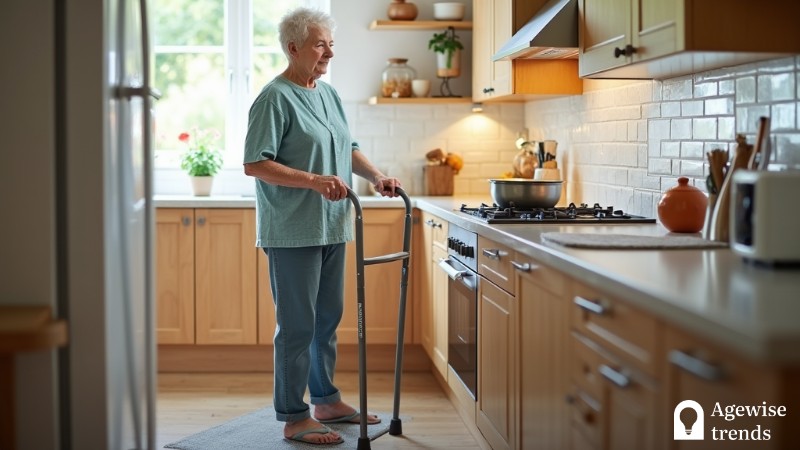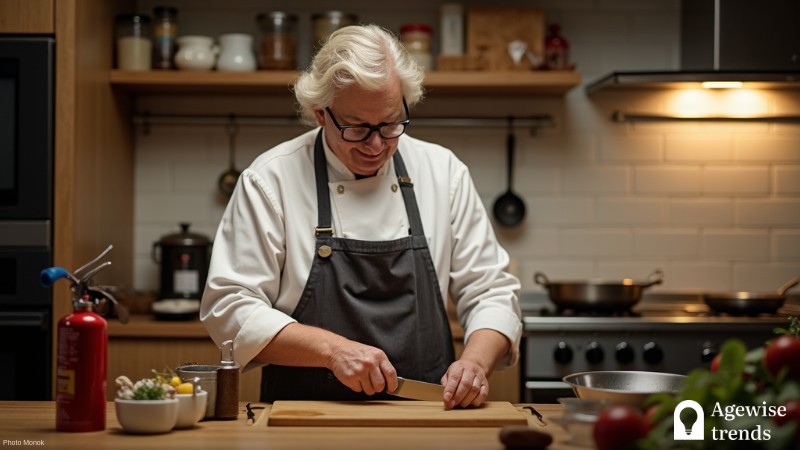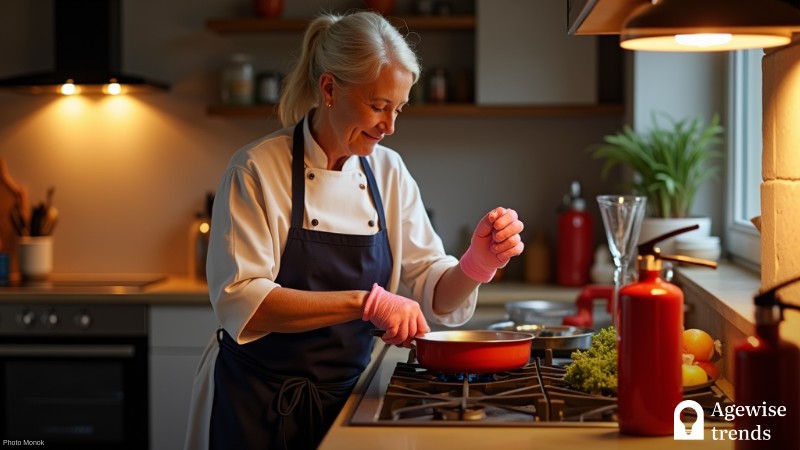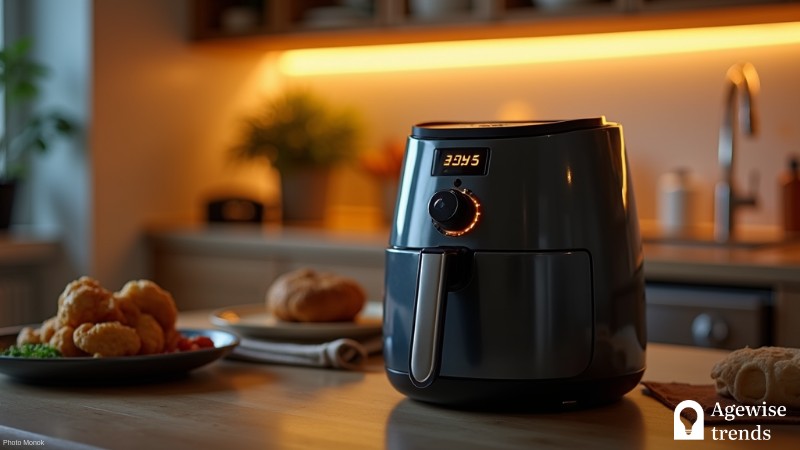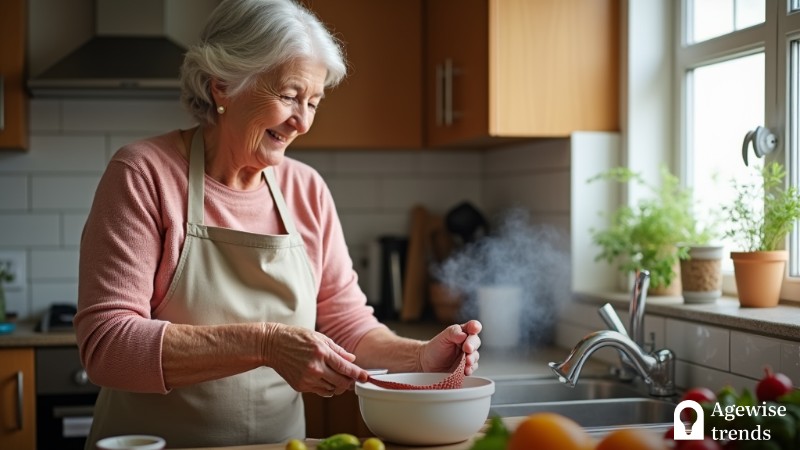Cooking is an essential part of daily life, but it can also be a dangerous activity, especially for seniors. With age, physical and cognitive changes can increase the risk of accidents, particularly in the kitchen, where slips, falls, and fires are common hazards. Fortunately, seniors can maintain their independence and safety by making a few simple changes to their kitchens and cooking habits. By following these key safety tips, older adults can continue to cook and enjoy meals with minimal risk.
Key Takeaways
Seniors can maintain their independence and safety in the kitchen by making simple changes to their kitchens and cooking habits.
- Good lighting is crucial in preventing slips and falls, so ensure that your kitchen is well-lit with light switches placed within easy reach.
- Use non-slip mats and anti-glare floor covers to reduce the chances of falls, and keep the kitchen floor free from loose rags, towels, or other tripping hazards.
- To prevent fires, never leave food unattended while frying, grilling, or broiling, and use automatic shut-off devices on stoves and ovens.
Preventing common kitchen hazards
The kitchen poses several risks, from hot surfaces and sharp knives to slippery floors and appliances left on. Understanding these risks and taking steps to prevent them is vital for seniors to stay safe.
Lighting and floor safety
Good lighting is crucial in preventing slips and falls. Older adults should ensure that their kitchen is well-lit, with light switches placed within easy reach. Installing night lights in areas where additional visibility is needed can also help seniors avoid stumbling in the dark.
For extra precaution, non-slip mats and anti-glare floor covers should be used to reduce the chances of falls. Keeping the kitchen floor free from loose rags, towels, or other tripping hazards is also essential for safety.
Cooking safety
Cooking is one of the most common causes of fires, and seniors are at an increased risk. It’s important to never leave food unattended while frying, grilling, or broiling, as these methods are especially prone to starting fires. For those using the stove or oven, automatic shut-off devices can help prevent accidents if the cooking process is forgotten.
Use lightweight pots and pans to minimize the risk of injury from dropped or tipped cookware. Additionally, seniors should keep flammable materials, such as towels, cloths, or curtains, away from the stove.
Appliance and fire safety
Unplug counter appliances when not in use and keep cords out of high-traffic areas to prevent tripping hazards. For added security, seniors with memory issues may benefit from childproofing cabinets and locking away dangerous items like knives, medications, and chemicals.
To reduce fire risks, always turn off the stove and oven after use, and never leave food unattended. Install smoke detectors and heat alarms, and in case of a fire, turn off the heat and evacuate the kitchen, closing the door to contain the flames.
Supporting independence through adaptations
Seniors can continue to cook independently, but the kitchen environment may need to be adapted for greater safety. Many devices and changes can make cooking easier and safer for older adults.
Smart kitchen technology: For seniors with dementia, smart kitchen devices like automatic shut-off stoves and alarms can help prevent accidents and ensure food is not overcooked.
Assistive devices, such as kettle tippers and reachers, make tasks easier for those with reduced mobility, while tactile labels and talking appliances assist individuals with visual impairments in reading recipes or setting timers.
Food safety and hygiene: Seniors are more prone to foodborne illnesses, so it’s important to wash hands before and after handling food, cook to the right temperature, and refrigerate leftovers promptly. Keep raw meat separate from ready-to-eat foods to avoid cross-contamination.
Keeping the kitchen organized can help seniors. Store frequently used items on lower shelves and consider pull-down shelves for easier access, especially for those with arthritis or limited strength.
Fall prevention strategies: Falls are a major risk for seniors, especially in the kitchen. Good lighting and non-slip mats help prevent accidents. Seniors should avoid loose clothing or jewelry that could catch on appliances or hot surfaces. Using a sturdy step stool instead of unstable chairs is also recommended for safely reaching high shelves.
Promoting safe and independent cooking
While cooking presents inherent risks, seniors can maintain their independence with the right safety measures in place.
By optimizing kitchen lighting, using assistive technology, and following basic cooking and appliance safety guidelines, older adults can significantly reduce their risk of accidents and continue to enjoy the benefits of cooking. With these practical tips, seniors can stay safe, retain their independence, and continue cooking for themselves without fear of injury.






